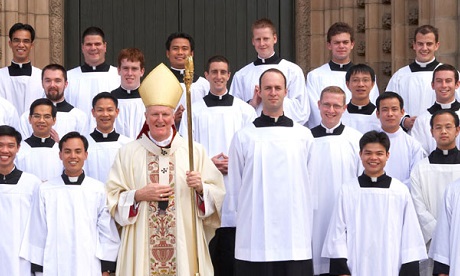Australia’s Catholic Church may scrap the centuries-old system of training priests in seminaries.
Two years after a royal commission exposed the scale of child abuse in the church, Catholic leaders are reshaping the way clergy are appointed.
This includes new screening and monitoring protocols for candidates and a revamped “national program of priestly formation” being developed.
It is also widely rumoured that church leaders are discussing dismantling the seminary system altogether.
They are considering a broader model of priest apprenticeships with more interaction with the community, it is said.
Current priestly formation generally requires living in an exclusive, male-dominated residential college.
At the college the seminarians work on a seven-year training programme with four dimensions: spiritual, pastoral, human and academic.
Church leaders accept that past practices such as poor vetting, inadequate lessons in celibacy and ministry and a clerical culture that shunned women contributed to the church’s abuse problem.
Evidence to the royal commission and subsequent legal cases showed a number of seminaries had become places where repressed young men would experiment sexually with one another with little consequence.
Some would later turn their attention to children in their parish.
Many priests began offending soon after they graduated.
The Australian Catholic Church now requires Catholic institutions, including seminaries, to meet new child protection standards.
They will be identified in public reports by the Catholic Professional Standards agency if they do not comply.
But Australian Catholics Bishops Conference chair Mark Coleridge says a “radical revision of how we recruit and prepare candidates for ordination” is needed for the church to learn from its past.
“Much has changed in our seminaries but one has to wonder whether seminaries are the place or way to train men for the priesthood now,” Coleridge says.
This is not a new idea of Coleridge’s. He has previously been reported as saying he is open to a priest “apprenticeship model”.
In this trainee priests could receive broader training at universities and parishes while still being appropriately “formed” spiritually, intellectually and pastorally.
Further reform is now underway.
Screening protocols have been agreed by the Bishops’ Conference and a review into the selection and training of clergy is currently underway.
This will form the basis of a new National Program of Priestly Formation, which the Conference will consider in November.
Source
